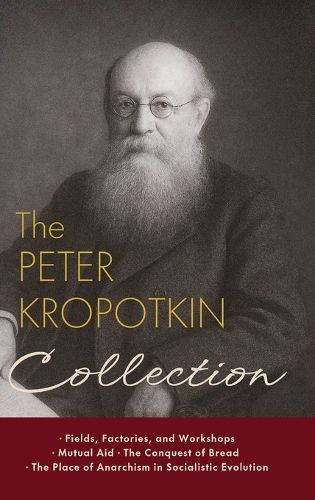Readings Newsletter
Become a Readings Member to make your shopping experience even easier.
Sign in or sign up for free!
You’re not far away from qualifying for FREE standard shipping within Australia
You’ve qualified for FREE standard shipping within Australia
The cart is loading…






This title is printed to order. This book may have been self-published. If so, we cannot guarantee the quality of the content. In the main most books will have gone through the editing process however some may not. We therefore suggest that you be aware of this before ordering this book. If in doubt check either the author or publisher’s details as we are unable to accept any returns unless they are faulty. Please contact us if you have any questions.
"Mutual aid is as much a law of animal life as mutual struggle." - Peter Kropotkin
The Peter Kropotkin Collection brings together four of the Russian philosopher's most influential works on political theory, economics, and social reform. A scientist, geographer, and revolutionary thinker, Kropotkin remains one of the most significant voices in the history of anarchism and socialism. His writings combine rigorous analysis with a deep faith in cooperation, mutual support, and human freedom.
Fields, Factories, and Workshops (1899) argues for the decentralization of industry and agriculture, envisioning self-sufficient communities where labor is reorganized around cooperation and sustainability.
Mutual Aid: A Factor of Evolution (1902) challenges the dominance of social Darwinism, presenting cooperation-not competition-as the true foundation of both nature and human society.
The Conquest of Bread (1892) critiques capitalism and outlines a vision of a just, communal economy where resources are shared and human needs are met without exploitation.
The Place of Anarchism in Socialistic Evolution (1884) distinguishes anarchism from other socialist traditions, presenting it as a natural extension of socialism rooted in voluntary association and freedom.
Together, these works represent the core of Kropotkin's philosophy-an enduring call for solidarity, decentralization, and the reorganization of society on cooperative lines. This collection is essential for students of political science, history, sociology, anarchist theory, and social reform.
$9.00 standard shipping within Australia
FREE standard shipping within Australia for orders over $100.00
Express & International shipping calculated at checkout
Stock availability can be subject to change without notice. We recommend calling the shop or contacting our online team to check availability of low stock items. Please see our Shopping Online page for more details.
This title is printed to order. This book may have been self-published. If so, we cannot guarantee the quality of the content. In the main most books will have gone through the editing process however some may not. We therefore suggest that you be aware of this before ordering this book. If in doubt check either the author or publisher’s details as we are unable to accept any returns unless they are faulty. Please contact us if you have any questions.
"Mutual aid is as much a law of animal life as mutual struggle." - Peter Kropotkin
The Peter Kropotkin Collection brings together four of the Russian philosopher's most influential works on political theory, economics, and social reform. A scientist, geographer, and revolutionary thinker, Kropotkin remains one of the most significant voices in the history of anarchism and socialism. His writings combine rigorous analysis with a deep faith in cooperation, mutual support, and human freedom.
Fields, Factories, and Workshops (1899) argues for the decentralization of industry and agriculture, envisioning self-sufficient communities where labor is reorganized around cooperation and sustainability.
Mutual Aid: A Factor of Evolution (1902) challenges the dominance of social Darwinism, presenting cooperation-not competition-as the true foundation of both nature and human society.
The Conquest of Bread (1892) critiques capitalism and outlines a vision of a just, communal economy where resources are shared and human needs are met without exploitation.
The Place of Anarchism in Socialistic Evolution (1884) distinguishes anarchism from other socialist traditions, presenting it as a natural extension of socialism rooted in voluntary association and freedom.
Together, these works represent the core of Kropotkin's philosophy-an enduring call for solidarity, decentralization, and the reorganization of society on cooperative lines. This collection is essential for students of political science, history, sociology, anarchist theory, and social reform.